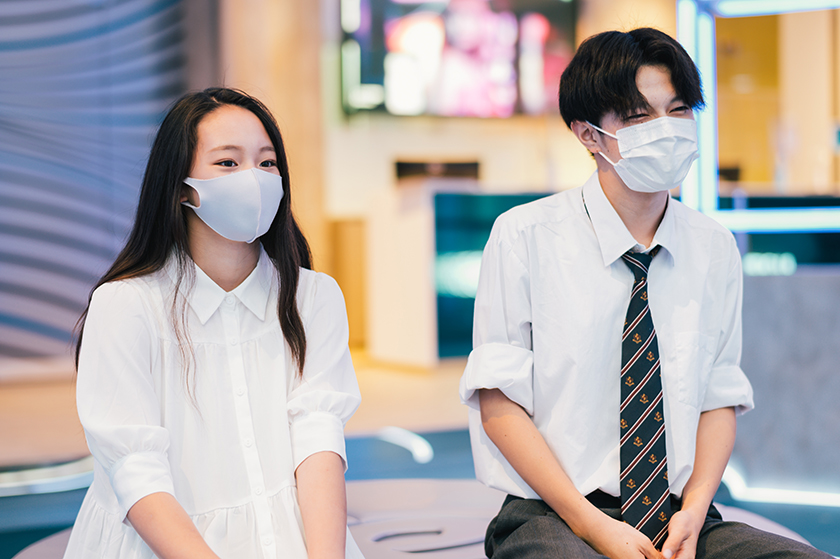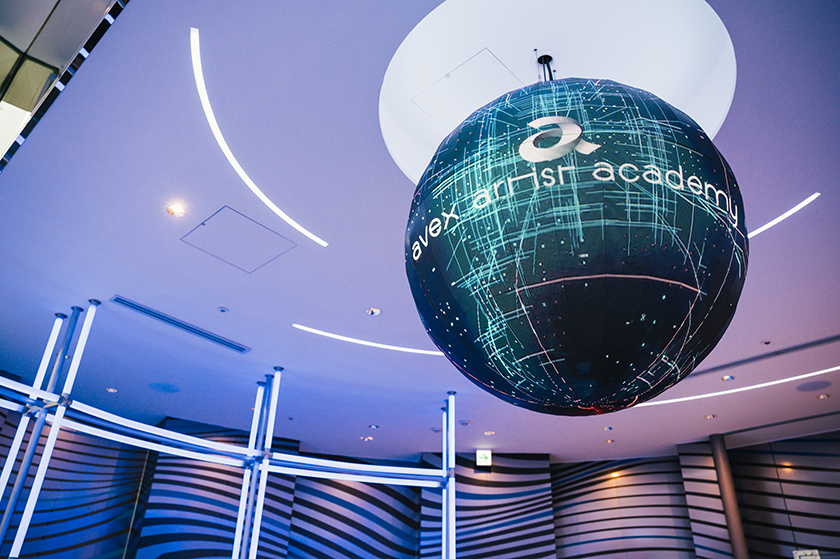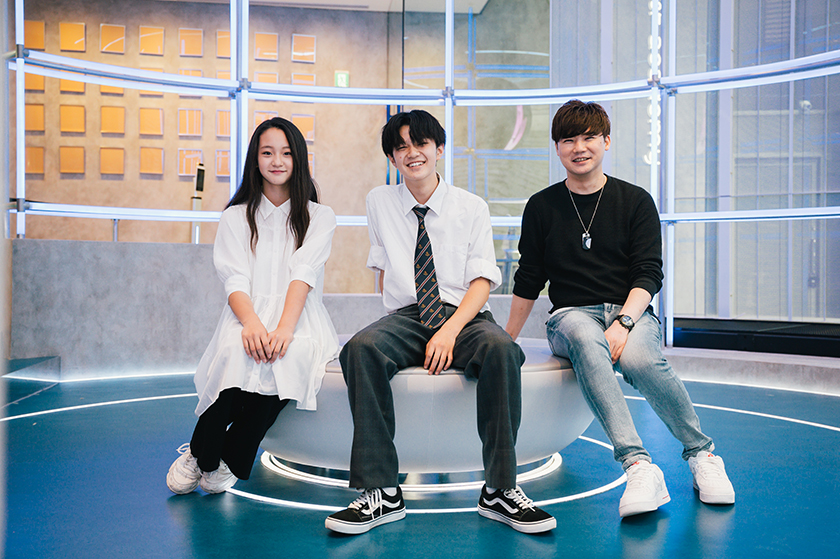The Avex Artist Academy opened in 2001 under direct management of Avex Management (AMG). With schools in four different cities—Tokyo, Nagoya, Osaka, Fukuoka—the academy has produced over 200 groups of artists and creators. Now, after 20 years since opening its doors, AMG has moved their Tokyo school from Harajuku to Shibuya, holding the opening ceremony on May 29th, 2021. The Academy has also rebooted anew with the clear object of cultivating a limited group of elite professionals. We spoke with Kosuke Fujii, Principal of the Tokyo School, to find out more behind the rebooting while zooming in on comments by two up and coming prospects attending the school, the changes the academy has gone through and its vision for the future.

Avex Management Inc. Kosuke Fujii
A school design that
matches the times.
Going back to the
roots of an elite school

Entrance Hall
Fujii first started his career at Avex as a Kansai area manager for Avex Dance Masters (DM) providing fitness clubs and other schools with curriculums developed at the Academy. He then became the principal of the Tokyo school in 2015 and is leading the newly rebooted location in Shibuya.
According to Fujii, there were two main reasons for the renewal.
Fujii “The first reason was that we needed a facility that matches the times. We changed our curriculums along the way to be in line with the times, but we had some catching up to do with our equipment, which have seen their fair share of wear and tear. At our new Tokyo school, we are able to record vocals in every studio, but this was only possible because we placed focus on the audio system wiring and layout.”
The second reason was due to Japan’s social issue of an aging population, which heavily affects the entertainment industry.
Fujii “We’re able to foresee a lower population in the academy’s main target, the younger generation, the stars-to-be. Up until now, we had about 2,500 students at a time attending the Tokyo school alone, and in that time we gradually noticed that they split into two types—those serious about becoming a pro, and those who came to learn something outside of their academic work. We needed to return to our roots in order to change this up. We wanted to turn it back into a place that supports those who are serious about going pro.”
Introducing an
entrance exam.
Cultivating pros

The evolutionary change they made in the new school’s system was the introduction of an entrance exam. Fujii conducted interviews and held auditions alongside the school’s course directors. Only those who passed the selection criteria were able to enroll in the academy.
There are only about 400 students enrolled in the academy now after implementing the exam. Compare that to the 2,500 enrollees they used to have and you can see just how the decision was.
Fujii “Looking back, we used to conduct auditions when we first opened the academy, so in that respect this is a return to our roots. In our entrance exam we place importance not only on skill, but on how strong their will to be pro is. Shingo Toguchi, the president of AMG and executive producer of the academy would always say, ‘those aiming to be a 50/100 will only put in 50% effort, but those aiming for a 100/100 will put in 100% every time.’ We take that into consideration when assessing each enrollee that walks through the doors.”
When informing those who did not pass the exam their results, not only do they do it one by one via mail or email, they also include advice on which course might fit them best, as well as the reasoning behind their decision—and for those interested, the opportunity to become a DM.
Fujii “The scope of our academy sector hasn’t shrunk in the least. We are able to offer those who didn’t pass the auditions a placement in our Dance Master course. To be honest, it can be a heavy weight for beginners to carry, being surrounded by people aiming to become pro right from the very beginning. From now on we’re making a clear differentiation between those in the Academy and those in the Dance Master course, but having them coexist. We have those who didn’t clear the entrance exam learn to be a Dance Master, and then welcome them into the academy some day in the future.”
It’s not
“what do you want to learn?”
It’s
“what do you want to be?”

Dance Studio
The Academy also drastically changed the way they design their courses. When deciding on what course fits the individual the best, importance is placed not on what talents they want to learn, i.e., dancing and singing, as they have done up until now, but rather on what the individual wants to become. There are now three main courses; the Dance Artist course, the Creator Artist course, and the Theater course.
Fujii “Among our past students, there have been people in the dance course who showed more aptitude for singing. There were even people who were learning things that didn’t suit their ideals. There is only so much time when you’re young and we don’t want them to take the long way of getting to where they want while learning. So we make sure to dial in on what they want to become right off the bat and clarify what they need to learn in terms of priority.”
It was also normal for students in a dance course to take one 90 minute lesson a week, but now the Academy offers limitless lessons. It seems students are now able to increase their weekly lessons X-fold, depending on their own drive.
Fujii “One of the stronger reasons we chose to do this was to remove the psychological barrier when having to choose a curriculum. Say, for instance, there is someone in the dance course taking one lesson a week. If they prefer Hip Hop then it’s only naturally they would take Hip Hop classes, but for those who are serious about becoming a professional, they have to learn other genres as well, like Jazz or House. If they’re able to take as many lessons as they want, they know that they have choices. We figured this would allow them to take interest in a variety of genres.”
The also designed the new facilities in order to improve the quality of the lessons. Each of the rooms offers users the ability to record vocals and co-write, which has become a common, if not main pillar of the music industry these days. They have also set up an online lesson system to accommodate changes due to the spread of the current pandemic. Teachers are able to communicate with their students remotely in real time from the Academy lesson rooms.

Vocal Studio

Recording Studio
In order to consistently instill students with the sense of standing on stage, they installed LED lights and moving graphic visuals along the walls and even introduced moving lighting, an addition that is not commonly seen in dance studios. This all creates an environment very similar to that of a live concert. These colorful lessons, high in share-ability, have had a great response from students.

Dance Studio
Fujii “One more thing, and this isn’t anything new, but we offer solo practice rooms with minimum audio systems. We always remind them to never let their lessons end with input, but to always have some output. It’s really easy to see how serious some students are about reaching their goals when they start reserving the solo practice rooms 5 times throughout the week.”
First class teachers
on the front line.
Hands-on cultivating of
artists with adaptability

Photo left)Hina Masuda
Photo right)Tsubasa Isozaki
The team that supports Avex’s first class artists, i.e., the producers, back dancers, voice trainers and A & R staff are also the teachers at the academy, and this is what gives them the advantage.
Let us shed some light on what a couple of students have to say about the academy’s teachers and curriculum. The first enrollee to share with us their thoughts is Tsubasa Isozaki, a sixteen-year-old learning dance and vocals in the Dance Artist course. Though he hasn’t been in the Academy for a long time, Fujii spoke positively of him, saying, “he has a lot of great things going for him, including his voice, which makes him stand out from the rest.”
Tsubasa “I used to admire the artists at LDH. And when I was accepted into the academy as a junior scholarship student, I knew I wanted to go after my dreams at Avex. I want to be one of their official artists. I’m taking vocal lessons from ICHIKAWA-sensei and he praised my singing a lot from the very beginning. He said, ‘You know what Bassa (Tsubasa’s nickname), don’t think too hard. Just sing how you’d like to. I’ll help you grow.’ I can feel myself improving and I’m having a lot of fun.”

The next student is the twelve-year-old Masuda Hina, taking the Creator Artist course. Being a member of the academy since she was nine, she used to want to become an artist who can sing and dance, but the longer she commuted to the academy the better idea she gained of what kind of artist she really wanted to become.
Hina “I joined the academy because I wanted to be in a dance and vocal group like lol or Da-iCE, but now I want to be a solo artist that can perform internationally and I’m taking the Creator Artist course now. The new school is really cool. The inside and the outside. It’s really exciting to go there. It makes you want to work even harder during the lessons. I’m taking lessons from ikki-sensei now and we’re working on the ‘Seven Layers Singing Method.’ We work on seven different aspects of singing at the beginning of the lesson: count, accent, breath and stuff.”
Teachers who have experience working with first-class artists help these talented youngsters with almost everything. And since members from the music sector and the management sector of the company are course supervisors, the Academy is able to cultivate artists with an adaptability that will serve them well after graduation.
Aiming to create strong
talented artists.
Elements needed in the
next generation of artists

Entrance Hall
Three keywords for Avex are “entertainment,” “tech,” and “global.” As the Avex group attempts to create cutting edge IP as a whole, the need for developing and cultivating artists is becoming greater and greater.
Fujii “You could say that building up the next generation of artists at the Academy is at our origin. This realization and sense of risk was one of the driving forces behind the decision to entirely reboot the academy at this point in time. Our biggest goal is to cultivate the artists that will help hold up Avex five, ten years from now. And that is exactly what we believe they will become.”
The most important talent that artists need to have, according to Fujii, is “empathy.”
Fujii “The ability to instill empathy, that is. The artist is only one person, but there are multitudes of personas amongst their fans. Since this is the era of social media, having people empathize with you is undoubtedly one of the most important powers to have. But it’s something that is hard to cultivate and even harder to aim and hit. Plus, as there are more and more artists coming up from TikTok, the field is diversifying, and we’re never really sure who will be the next star or where they will appear from. One of the keys, however, I believe is empathy.”
Even though we are seeing a rise of “accidental” hit artists and content, the Academy insists on continuing to aim for “inevitable” ones by creating a solid foundation for young artists.
Fujii “What I mean by foundation is more than just skill. Executive Producer Toguchi would also say, ‘Half of one’s ability is in work ethic, the other half is in their human resourcefulness.’ It might sound like a given, but artists with a good balance between work ethic and resourcefulness is something really difficult to develop. The Academy is ultimately an educational facility, so we’ll continue to develop solid human talent, including the cultivation of aesthetic and moral sentiment.”
Out of the whole Avex group, the Academy possesses one of the highest and fastest turnouts of successful talent. Some may take three to five years to get their breakthrough, while for some it might even take ten. Either way, Avex will continue down the long and windy road, planting seeds of entertainment within young talent, watering them when needed, giving them plenty of sunlight and staying with them until they bloom.
The entertainment industry never stops evolving and never slows down. As the times show less and less clear-cut methods of creating hit entertainment, it is difficult to express an definite optimistic outlook for the future of Avex. One thing is for sure though; Avex’s bright future depends on the success of their Academy.

(Photo left)
Hina Masuda
(Photo center)
Tsubasa Isozaki
(Photo right)
Avex Management Inc.
Avex Artist Academy
Principal of the Tokyo School
Kosuke Fujii









